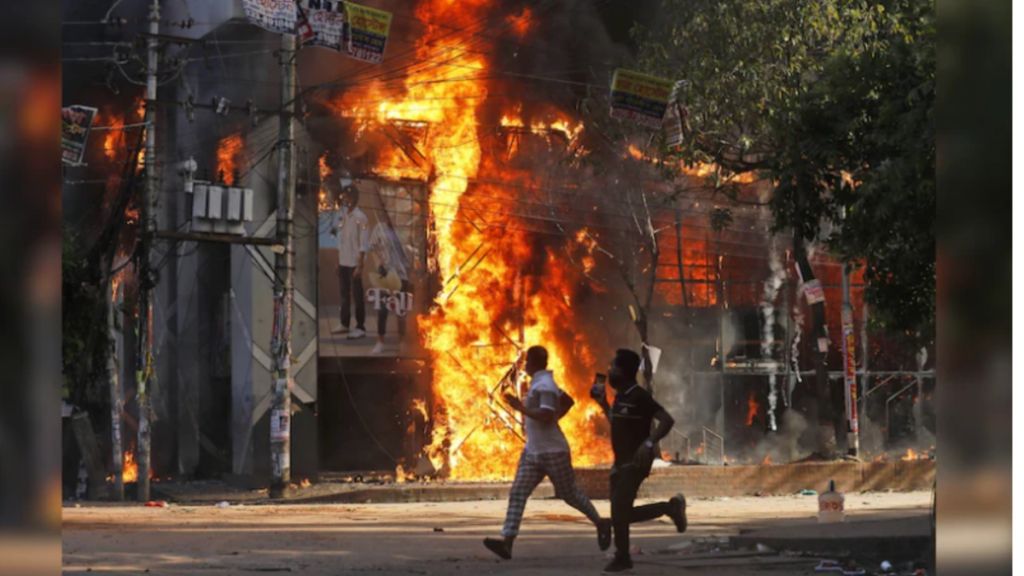
Relations between India and Bangladesh have been going downhill since the August 5 regime change in Bangladesh following widespread students’ protests. Even at that time mobs had unleashed violence against Hindu minorities all over the country. Several Hindus were murdered, their properties looted and women molested by the marauding mobs supported by the extremist Islamic outfits. However, it was hoped that with the setting up of an interim government a modicum of order will return to the riot-torn country. Unfortunately, that has not happened. The anti-India character of the interim regime only further fuels the hoodlums to target minorities. Despite India repeatedly counselling measures for the protection of minorities, incumbent rulers in Dhaka have merely looked the other way while politically-supported thugs attack Hindus, looting their homes and shops, very often with police encouragement. That is why the arrest on Tuesday of Iskcon priest Chinmoy Krishna Das Brahmachari comes as a huge shock since his only crime was to peacefully protest the daily atrocities being committed against the minorities. For his sincere effort to provide moral and psychological support to the persecuted minorities by violent mobs let loose by the interim government, Brahmachari has been most arbitrarily thrown in jail. And a kangaroo court has peremptorily denied him bail after sedition charges were slapped against him. Such are the anarchical conditions in Bangladesh that the priest’s lawyer was lynched by a mob right in the court complex on Tuesday in the very presence of the police. One need not dwell further on the criminal character of the interim regime, though notionally it is headed by Muhammad Yunus who either seems unwilling to control the violent elements targeting minorities, or his writ does not run at all. It is for Yunus to decide whether he would continue to be associated with such a regime, which wilfully persecutes minorities, or in the winter of his life ephemeral titles such as “chief adviser” to the interim regime of odd-bod anti-India elements are more important than concerns for universal human rights and values.
The Indian government’s strong reaction to the arrest of the priest and the slapping of sedition charges against him is fully warranted. Bangladesh may pro forma reject India’s concerns, and call these an interference in its internal affairs, but the situation on the ground in the country is so dire for the minorities that any impartial observer can gauge the fear and insecurity that prevails in the community. The Iskcon priest, who is also the spokesperson of the Sammilit Sanatan Jagran Jote, has sought justice for the victims of the widespread anti-Hindu riots and killings in the wake of the fall of the Sheikh Hasina government. Pro-Pakistan elements belonging to the Bangladesh Jamaat-e-Islami are in the lead in launching attacks on minorities. As the spokesperson for the Ministry of External Affairs said, “There are several documented cases of arson and looting of minorities’ homes and business establishments, as well as theft and vandalism and desecration of deities and temples.” The interim regime in Dhaka cannot fob off accountability by merely denying the charges. It needs to prove its credentials as a responsible government capable of restoring order and protecting all sections of the population irrespective of their religious faith and/or political leanings. Otherwise, it faces the genuine threat of being treated as a pariah not only by India but by the world at large. Of course, India cannot sit idly by even as the minorities are violently attacked and persecuted in its neighbourhood. Meanwhile, the longer the lawlessness and mayhem prevails in Bangladesh the less will be of its chances of economic recovery. Its mainstay garments export industry cannot be back on its feet unless there is a modicum of peace and security in the country. Bangladesh will ignore the multi-faceted challenge it faces, instead of playing into the hands of the Islamist jihadis and anti-India goons.